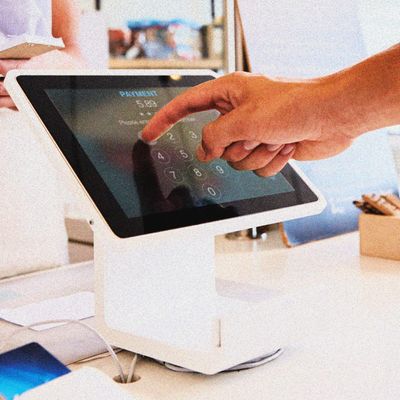
Tipping is as American as baseball or gun violence. The rules governing the practice were never totally straightforward and have always been wrapped up in issues of sex, race, and class. But tipping has become even more enmeshed in society over the past few years: It surged during the pandemic for good reason and is now de rigueur at more places than ever with the rise of digital-touchscreen payment systems. This “tip creep” has led to new questions: For instance, do you need to add a dollar for a purchase of bottled water? (New York’s recent guide to tipping etiquette leaned yes; an online backlash ensued.) I spoke with Michael Lynn, a professor of consumer behavior and marketing at the Cornell University School of Hotel Administration, who has been studying why and how Americans tip for decades, about the new landscape and why efforts to move away from gratuities in America always fail.
It’s a norm of American culture to tip bartenders, waiters, waitresses. But recently, there’s been a proliferation of touchscreens at cafés, restaurants, and other places, which encourage people to add gratuities for services that haven’t always been associated with them. It feels like a new rule of society that just got rolled out one day to the next and —
Hold it. Hold it. What do you mean it’s a “rule of society”? Who is saying that you have to do that?
What you should take from that screen is that the employees at the establishment want you to tip them. And the employer is at least willing to go along with it. That doesn’t mean that it’s normative, or that you have to do it, or even that other people are. I have to see what the numbers are after the pandemic, but before, only about 25 percent of people would tip on restaurant carryout. People asked for a tip on restaurant carryout, but it didn’t mean that was normative. In fact, 75 percent of people didn’t do it. It does mean they want you to, it does mean they’ll think less well of you if you don’t, but fuck them. Excuse my language.
Wow, you’re passionate about this issue. I appreciate that. But what I was saying is that there’s been a change — a nudge, to use the word favored by the economists Richard Thaler and Cass Sunstein. And it does have an effect on people’s behavior — it does make them feel guilty. You say other people aren’t doing it, which may be true, but it makes you feel like other people are doing it, and that’s a big psychological change.
That’s where reporters like you can come in and say, “Wait a minute. Everybody may be asking, but that doesn’t mean everybody’s giving.” And don’t feel like you have the weight of the entire society pressuring you to tip. No. You have the weight of those employees pressuring you to tip. And if you want to succumb to that pressure, if it really bothers you to have them think badly of you, by all means, tip them. But I don’t feel that pressure nearly as strongly, whereas I do feel it more strongly when I know it’s a societal norm.
A few years ago, it seemed like there was some movement toward getting rid of tipping at restaurants by upping menu prices. Now there’s none. Why do attempts at reform never work?
That’s easy to answer. It’s because if a restaurant that gets rid of tipping can’t absorb the increased labor cost, their profit margins won’t be high enough. They’re getting asked to either increase menu prices or add an automatic service charge. And neither of those is popular with consumers. People hate service charges — they view them as a mandatory tip and say, “By God, you’re not going to tell me what I have to do.”
Even though you’re going to do it anyway.
Yeah. And people don’t like higher menu prices. You might think, Wait a minute — but you’re not tipping anymore. When people judge restaurant expensiveness, they look at menu prices, and they tend to ignore the tipping component. And maybe if everyone were to eliminate tipping and raise menu prices, you’d think, Okay, my menu prices would be higher, but so would everyone else’s, so when people make a comparison, you’re not so bad off. But you can’t do it collectively — that’s price collusion. If you get rid of tipping and replace it with higher menu prices, you look more expensive than your neighbor who has tipping, so you’ll lose business.
I’ve done the research, looking at online ratings and how ratings of restaurants change with changes in their tipping policies. Restaurants that get rid of tipping — their online ratings go down. The only exception is if it is a really upscale restaurant that replaces tipping with higher menu prices, because apparently upscale customers are less price sensitive. But even upscale restaurants, if they replace tipping with service charges, their online ratings go down.
Danny Meyer was a high-profile example of this. In 2015, he banned tipping at his restaurants, most of which are pretty upscale. And even that didn’t work.
The other issue is that Danny Meyer promised his servers that they wouldn’t be hurt by his move away from tipping, and he really did make an effort. He paid them the same wage they got when they were tipped employees. The problem is during that time frame, prices kept rising. And as prices rose, tips did, too. Other servers were getting those increased tips, but his weren’t because they worked at non-tipping establishments. And so, over time, they actually started making less relative to what they would have had there been a tipping system. And then he started losing staff.
And then the pandemic hit and Meyer just scrapped the entire thing, and now it feels like there’s no momentum toward change.
And there wasn’t that much momentum before. There were just a handful of prominent restaurateurs who were experimenting with no tipping. A similar thing happened in the ’80s, when there was a lot of press given to a couple of restaurateurs who tried to eliminate tipping, but it didn’t take off. And it’s unlikely to.
I was also thinking of Uber, a service that started out as no-tipping, part of its frictionless image — but then there was an outcry from consumers who wanted an option to do so.
You can point to a couple of instances, but no, there was actually not a nationwide outcry from consumers saying, “Let us tip the Uber driver.” They could always tip cash. It was the Uber drivers themselves who were saying, “We want tips.” There were some petitions where consumers asked to do it. But that was never super-big.
Okay, I stand corrected. I was just trying to use that as an example of how Americans are built to do this in a way unlike any other nationality.
Absolutely true. We tip more people and in larger amounts than in any other country.
It’s long been established by you and others that there’s very little correlation between quality of service and tips. And also that tipping reflects racism and sexism. Black servers get tipped less than white ones, for instance.
There is data suggesting that Blacks get lower tips than whites and that attractive women get more than less attractive women. We could use more data on that, but there’s a reasonable amount of data suggesting those things.
Given there’s been such a reckoning on race and sex in recent years, are you surprised that there hasn’t been more of a backlash on those grounds over the years?
What I’m surprised about is that there hasn’t been some class-action lawsuit, to be honest with you. But most people aren’t aware of the racial implications or the sexism implications of tipping.
Going forward, I mean, I do think there’s potential for a class-action lawsuit saying, for example, “Our major form of compensation is tips, and I’m getting tipped less than the white servers, and that’s a disparate impact.” The Supreme Court has argued that if neutral business practices have a disparate impact on protected classes, they’re unlawful. Arguably, tipping is one of those neutral business practices that has a disparate impact. I think there’s a real potential for a lawsuit there. And if it did come, that would go a long way to making tipping not so economically viable.
Have you seen any sign of that American influence extending to other countries and tipping becoming more commonplace in Europe, Asia, anywhere else in the past few years?
Yeah. In fact, there’s a guy named Mansfield who did a study looking at exactly that. And the more people in a country visit the United States, the more they tip in that country.
And yet Americans who go to Europe come back and they’re not influenced by European culture. It only goes one way.
The ironic thing is that tipping was more common in Europe than in the U.S. in the late-19th century — the 1880s, 1890s. It was American travelers to Europe who brought tipping back. And now we do it more than anyone else, and we’re exporting it again. I think it’s easier to adopt tipping than it is to get rid of it.
It seems like it’ll probably be an American custom forever.
Yeah, unless there’s some legal action.
This interview has been edited for length and clarity.






























